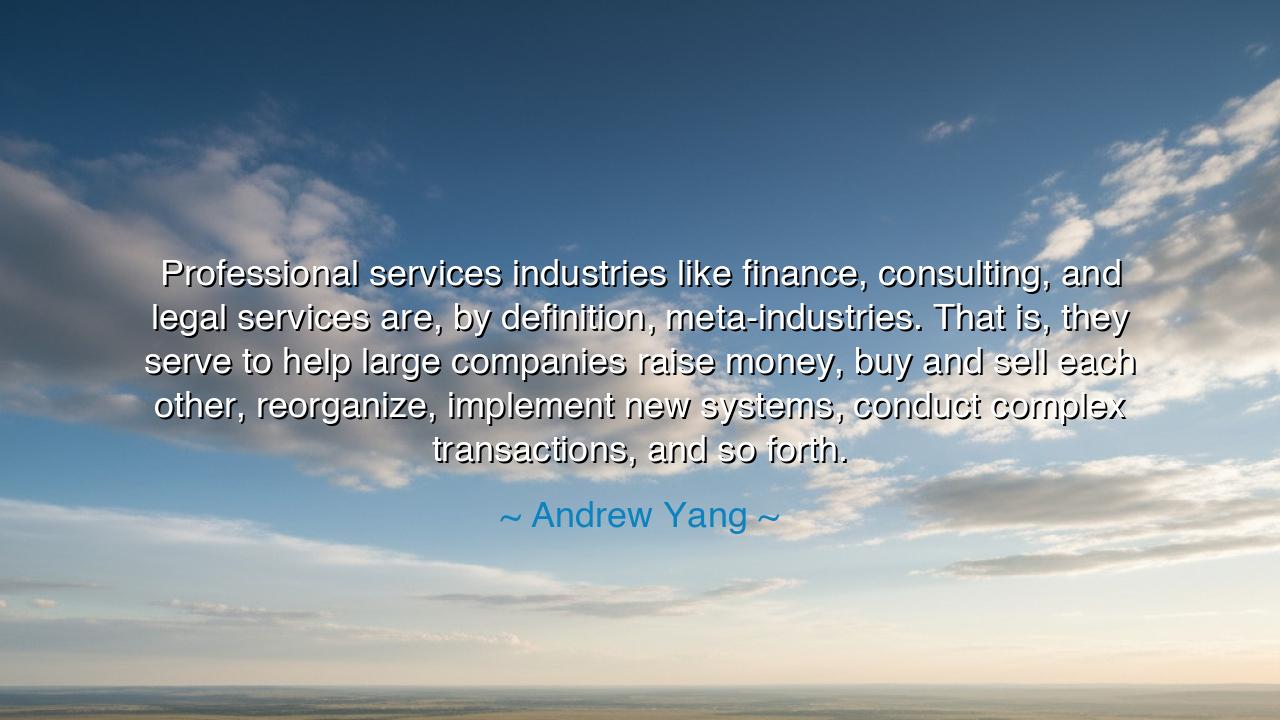
Professional services industries like finance, consulting, and
Professional services industries like finance, consulting, and legal services are, by definition, meta-industries. That is, they serve to help large companies raise money, buy and sell each other, reorganize, implement new systems, conduct complex transactions, and so forth.






When Andrew Yang declared, “Professional services industries like finance, consulting, and legal services are, by definition, meta-industries. That is, they serve to help large companies raise money, buy and sell each other, reorganize, implement new systems, conduct complex transactions, and so forth,” he spoke as a man peering into the hidden machinery of modern civilization. His words pull back the curtain on the silent engines that drive the world economy — those who do not till the fields nor forge the iron, but instead engineer the flow of power and capital between those who do. It is a statement not of condemnation but of clarity: that these professions exist not as creators of tangible goods, but as builders of structure, weaving invisible frameworks that sustain the movement of wealth and influence across nations.
In the style of the ancients, one might say Yang is describing the “priesthoods” of the modern age. For just as the priests of old mediated between mortals and gods, so do the meta-industries mediate between creators and their creations — between the hands that make and the minds that manage. The lawyer ensures that every pact is honored; the financier transforms risk into opportunity; the consultant translates chaos into method. Yet, like the temples of Babylon or Rome, these professions thrive not from the earth but from the labor of others — they are the servants of the system, and through their mastery, they help to maintain it. Their purpose is not to create, but to enable creation to continue. And though unseen, their influence shapes the destinies of empires.
The origin of Yang’s insight lies in his lifelong study of economics, innovation, and the intersection between human labor and systems. Before entering politics, he spent years in the very world he now dissects — the realm of startups, law firms, and financial organizations. Through this experience, he came to see that much of modern industry no longer builds or produces, but instead manages, advises, and optimizes. These “meta-industries,” as he calls them, thrive on the activity of others. When a company is born, grows, merges, or dies, it is these professions that chart its course. In their hands lies not the hammer of the builder, but the blueprint of society. They are, in essence, the architects of the invisible.
History offers parallels to this insight. In the courts of ancient China, the scholar-officials — the mandarins — did not sow nor trade, yet they governed the empire through knowledge, writing, and ritual. They were the guardians of order, translating the will of the emperor into the language of law and administration. In Renaissance Florence, the Medici bankers wielded similar power, not through armies but through finance, deciding the fate of kingdoms with the stroke of a quill. So too in our age, the financiers, consultants, and lawyers of great corporations shape the flow of civilization. The products they create are intangible, but their effects are profound — influencing who prospers, who fails, and how wealth circulates through the arteries of society.
Yet in Yang’s statement lies not only observation but warning. For a civilization that depends too greatly on its meta-industries risks drifting away from the tangible, from the real work of making and building. When the economy becomes a hall of mirrors — where industries exist only to serve other industries — then value becomes abstraction, and the people who labor with their hands may find themselves forgotten. The ancients would have recognized this imbalance as hubris: the triumph of intellect over substance, of form over spirit. For even the most intricate system must ultimately rest upon the strength of what is real — the farmer’s harvest, the builder’s stone, the craftsman’s hand. Without these, all the meta-structures of law and finance are but castles built on sand.
Still, Yang’s insight carries hope as well as critique. These meta-industries, when guided by wisdom, can be forces of harmony. The law can protect the weak; finance can empower the visionary; consulting can bring order to chaos. The danger lies not in their existence, but in their detachment — when they serve only profit, and forget the human purpose they were meant to uphold. For every system, no matter how vast, exists to serve people, not the other way around. Thus, the call is for balance — for those within these professions to remember that their highest purpose is not manipulation, but stewardship; not dominance, but service.
The lesson of Yang’s words is timeless: do not mistake complexity for wisdom, nor systems for society. The most intricate network is meaningless if it forgets the human heart it was meant to sustain. To those who labor in these meta-industries, let this teaching be remembered: you are the custodians of civilization’s invisible framework. Use your skill not to entangle, but to uplift; not to exploit, but to enlighten. And to the builders, the dreamers, and the workers, remember too — that no empire stands by intellect alone. The world endures through the union of mind and hand, thought and deed, idea and action.
So let Yang’s words echo as both revelation and challenge: that a healthy society must weave its meta-industries into the living fabric of its people, ensuring that systems serve life — not life, the system. For when law, finance, and counsel remember their roots in service, they become what they were always meant to be: the nervous system of civilization, guiding its limbs toward creation, justice, and the common good. And in that harmony — between the makers and the mediators, between the seen and the unseen — the true health of a nation is found.






AAdministratorAdministrator
Welcome, honored guests. Please leave a comment, we will respond soon